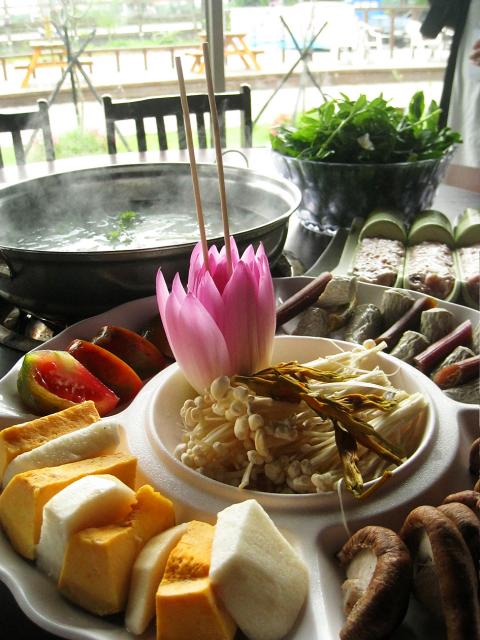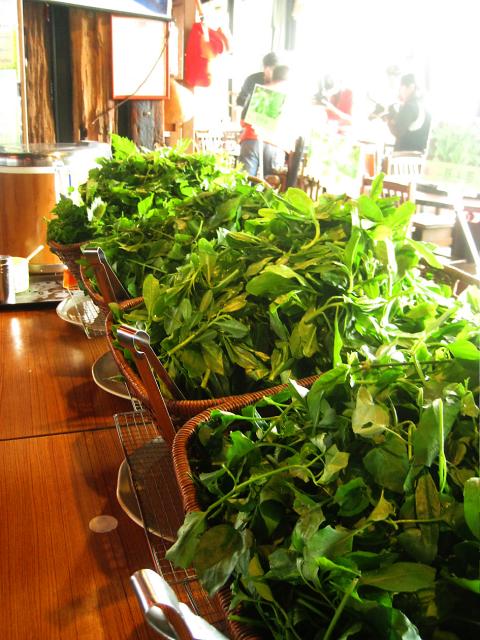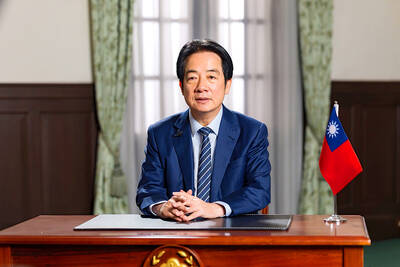The Cherry Field Restaurant, though established by an immigrant from Taipei, has become one of Hualien’s showcase dining establishments. Health is front and center at Cherry Field, as owner Chen Ying-mei (陳櫻美) created the restaurant after coming to Hualien to recover from surgery for thyroid cancer. Friends from around the county, including Hakka, Hoklo and Aboriginal people, told her about many different folk remedies making use of Hualien’s vast selection of flora, much of it ignored by mainstream agriculture. She has included this experience in the creation of Cherry Field, a hot pot restaurant whose main feature is its buffet of five kinds of foraged wild greens that not only provide a unique flavor, but also all kinds of healthful benefits (including reduced cancer risk).
Personally I am always slightly dubious about restaurants that put health before flavor, as their claims for various therapeutic effects seem to be little more than an excuse for dishes lacking either character or balance. I was therefore rather skeptical about Cherry Field, but the buffet of vibrant-looking greens on the sideboard looked remarkably appealing. Staff encourage diners to use a mixture of all five available greens, which are selected from a range of 16, depending on availability. I had not heard of many of these plants, and the selection of nine herbal broths into which these greens were to be immersed was equally unfamiliar, though I did recognize aged radish and ginseng. The broths are all light, and need the wild greens to give them complexity. It is further enriched by meat, fish and other mainstream vegetables. A healthy hot pot (養生火鍋) with meat is NT$390 a head, featuring unlimited access to wild greens, chicken, pork and fish. A vegetarian version with a good selection of mushrooms to replace the meat is NT$300.
If the mix of wild greens is simply too medicinal in flavor (and it has to be admitted, these greens mostly fall into the category of bitter herbs, which accounts for their lack of popularity in the regular vegetable market, and is also a reason why they can grow successfully without the aid of pesticides), Cherry Field offers a wide selection of innovative and mainstream hot pots from heavily marbled “snow flake” prime beef hot pot (霜降牛肉鍋, NT$390 a head) to pumpkin hot pot (南瓜鍋, NT$250 a head). While there are plenty of vegetarian options available, meat eaters are catered to with a plentiful selection of choice and prime cuts.

Photo: Ian Bartholomew, Taipei Times
Cherry Field is primarily a hot pot restaurant and is ideally suited for tables of four and above. That said, the establishment also offers a selection of individual sets and a la carte dishes, many of them vegetarian. Quality is well above average and its pork trotter with dry pickled Chinese mustard (陳梅弄豬手, NT$200) and mountain yam with monkey head mushrooms (山藥猴頭菇, NT$200) are highly recommended.
Although the setting at Cherry Field is casual, considerable care is taken over presentation, and a high point of a hot pot meal is the immersion of a lotus flower into the pot at the beginning of the meal. Inevitably, health benefits are attributed to the flower, but the effect is also quite beautiful, and gives the meal a lovely sense of theater. The big cavernous interior of the restaurant can be a bit intimidating for couples, but the space has been well divided to provide a degree of intimacy for smaller tables.
Service is efficient and staff are helpful in instructing diners in the best way of navigating the complex menu. The selection of food is wide enough that healthy eaters and gourmands can all find some degree of satisfaction, and for those who find something that really flips their switch, many of the condiments used in the preparation of food at Cherry Field (most made by the restaurant), are also available to take home. It goes without saying that Cherry Field’s food ticks all the health boxes from high fiber, organic, low salt and of course no MSG.

Photo: Ian Bartholomew, Taipei Times

This month the government ordered a one-year block of Xiaohongshu (小紅書) or Rednote, a Chinese social media platform with more than 3 million users in Taiwan. The government pointed to widespread fraud activity on the platform, along with cybersecurity failures. Officials said that they had reached out to the company and asked it to change. However, they received no response. The pro-China parties, the Chinese Nationalist Party (KMT) and Taiwan People’s Party (TPP), immediately swung into action, denouncing the ban as an attack on free speech. This “free speech” claim was then echoed by the People’s Republic of China (PRC),

Most heroes are remembered for the battles they fought. Taiwan’s Black Bat Squadron is remembered for flying into Chinese airspace 838 times between 1953 and 1967, and for the 148 men whose sacrifice bought the intelligence that kept Taiwan secure. Two-thirds of the squadron died carrying out missions most people wouldn’t learn about for another 40 years. The squadron lost 15 aircraft and 148 crew members over those 14 years, making it the deadliest unit in Taiwan’s military history by casualty rate. They flew at night, often at low altitudes, straight into some of the most heavily defended airspace in Asia.

Many people in Taiwan first learned about universal basic income (UBI) — the idea that the government should provide regular, no-strings-attached payments to each citizen — in 2019. While seeking the Democratic nomination for the 2020 US presidential election, Andrew Yang, a politician of Taiwanese descent, said that, if elected, he’d institute a UBI of US$1,000 per month to “get the economic boot off of people’s throats, allowing them to lift their heads up, breathe, and get excited for the future.” His campaign petered out, but the concept of UBI hasn’t gone away. Throughout the industrialized world, there are fears that

The Democratic Progressive Party (DPP) controlled Executive Yuan (often called the Cabinet) finally fired back at the opposition-controlled Legislative Yuan in their ongoing struggle for control. The opposition Chinese Nationalist Party (KMT) and Taiwan People’s Party (TPP) acted surprised and outraged, but they should have seen it coming. Taiwan is now in a full-blown constitutional crisis. There are still peaceful ways out of this conflict, but with the KMT and TPP leadership in the hands of hardliners and the DPP having lost all patience, there is an alarming chance things could spiral out of control, threatening Taiwan’s democracy. This is no